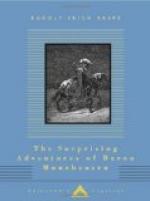The Seventh Edition, published in 1793, with the supplement (pp. 142- 161), was, with the abominable proclivity to edification which marked the publisher of the period (that of “Goody Two-Shoes” and “Sandford and Merton"), styled “Gulliver Reviv’d: or the Vice of Lying Properly Exposed.” The previous year had witnessed the first appearance of the sequel, of which the full title has already been given, “with twenty capital copperplates, including the baron’s portrait.” The merit of Munchausen as a mouthpiece for ridiculing traveller’s tall-talk, or indeed anything that shocked the incredulity of the age, was by this time widely recognised. And hence with some little ingenuity the popular character was pressed into the service of the vulgar clamour against James Bruce, whose “Travels to Discover the Sources of the Nile” had appeared in 1790. In particular Bruce’s description of the Abyssinian custom of feeding upon “live bulls and kava” provoked a chorus of incredulity. The traveller was ridiculed upon the stage as Macfable, and in a cloud of ephemeral productions; nor is the following allusion in Peter Pindar obscure:—
“Nor have I been
where men (what loss alas!)
Kill half a cow, then
send the rest to grass.”
The way in which Bruce resented the popular scepticism is illustrated by the following anecdote told by Sir Francis Head, his biographer. A gentleman once observed, at a country house where Bruce was staying, that it was not possible that the natives of Abyssinia could eat raw meat! “Bruce said not a word, but leaving the room, shortly returned from the kitchen with a piece of raw beef-steak, peppered and salted in the Abyssinian fashion. ‘You will eat that, sir, or fight me,’ he said. When the gentleman had eaten up the raw flesh (most willingly would he have eaten his words instead), Bruce calmly observed, ’Now, sir, you will never again say it is impossible.’” In reality, Bruce seems to have been treated with much the same injustice as Herodotus. The truth of the bulk of his narrative has been fully established, although a passion for the picturesque may certainly have led him to embellish many of the minor particulars. And it must be remembered, that his book was not dictated until twelve years after the events narrated.




